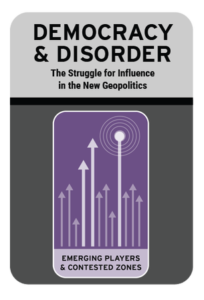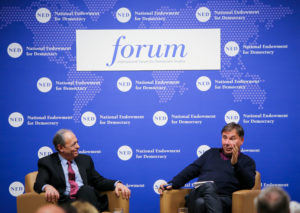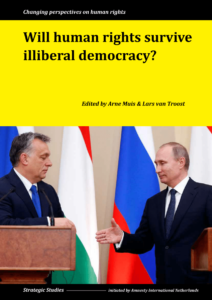 Conventional wisdom has long held that democratic consolidation is a one-way street and that democratic states, once reaching a certain level of GDP per capita, are immune to democratic breakdown. This may no longer be the case, and trends over the last decade show that even wealthy and established democracies are not safe from retrenchment, a new analysis suggests.
Conventional wisdom has long held that democratic consolidation is a one-way street and that democratic states, once reaching a certain level of GDP per capita, are immune to democratic breakdown. This may no longer be the case, and trends over the last decade show that even wealthy and established democracies are not safe from retrenchment, a new analysis suggests.
The emergence of illiberal states within the European Union and NATO presents a challenge to Western collective action in an era of great power competition, according to The anatomy of illiberal states: Assessing and responding to democratic decline in Turkey and Central Europe. In particular, illiberal leaders and political parties are threatening democracy by targeting judicial oversight, pluralistic and fair political systems, independent media, and open civil society, the Brookings report adds, analyzing the illiberal toolkit—a set of tools, tactics, and practices used by forces in power to roll back checks and balances.
The report highlights Turkey, Hungary, and Poland, where democratic rеgression has drawn the most concern, but it also considers Slovakia and the Czech Republic, states exhibiting warning signs.
 Illiberal and autocratic-leaning leaders subvert key tenets of liberalism including an expansive vision of national identity that encompasses all citizens, regardless of ethnic, religious, or political identity, the authors argue:
Illiberal and autocratic-leaning leaders subvert key tenets of liberalism including an expansive vision of national identity that encompasses all citizens, regardless of ethnic, religious, or political identity, the authors argue:
- First, leaders including Erdoğan, Orbán, and Kaczyński have narrowed the definition of “the people” down to those who support the government and its actions, while ostracizing foreigners and stoking nationalism. Their anti-pluralism instrumentalizes the powerful force of nationalism as an exclusive sentiment based on ethnic, cultural, and religious identity (“ethnic nationalism”) rather than a concept based on citizenship rights (“civic nationalism”). …
 Second, illiberal actors are co-opting the concept of liberal democracy. As Ivan Krastev (right) notes, “[populist parties] attract those who view the separation of powers (the institution perhaps most beloved by liberals) not as a way to keep those in power accountable but as a way for elites to evade their electoral promises.” In other words, the populist challenge is an “illiberal democratic response to undemocratic liberalism.”
Second, illiberal actors are co-opting the concept of liberal democracy. As Ivan Krastev (right) notes, “[populist parties] attract those who view the separation of powers (the institution perhaps most beloved by liberals) not as a way to keep those in power accountable but as a way for elites to evade their electoral promises.” In other words, the populist challenge is an “illiberal democratic response to undemocratic liberalism.”
For example, the lengthiest and most thoroughgoing aspect of the Hungarian government’s illiberal toolkit has been its attack on civil society, the report notes:
In 2013, government-friendly media initiated attacks on civil society organizations in receipt of funding from the Norwegian government’s international NGO fund. The following year, police special forces raided the offices of the Hungarian organization that disbursed the Norwegian funds, stating that the money was improperly given to local groups with “leftist political ties.” That summer, Orbán delivered what has since proven to be a prophetic speech in which he praised the concept of “illiberal democracy” and cited Singapore, China, India, Turkey, and Russia as “stars of international analysts.”
 “This model entails a simulacrum of democracy, one in which opposition parties and a handful of independent civil society and media outlets exist, but only to mask what is in effect a one-party state,” it adds.
“This model entails a simulacrum of democracy, one in which opposition parties and a handful of independent civil society and media outlets exist, but only to mask what is in effect a one-party state,” it adds.
But “the ‘democratizing edge’ of their illiberal actions also makes it difficult to ascertain how to respond effectively,” note the authors, Brookings experts Alina Polyakova, Torrey Taussig, Ted Reinert, Kemal Kirişci, Amanda Sloat, James Kirchick [a former Penn Kemble fellow at the National Endowment for Democracy], Melissa Hooper, Norman Eisen and Andrew Kenealy.
The report offers recommendations for policymakers and other actors to secure and re-energize democratic institutions and norms in the trans-Atlantic space:
- NATO must make adherence to democratic principles a core strategic priority as it marks its 70th anniversary in 2019;
- the EU should adopt rule of law conditionality for structural funds for member states;
- the U.S. Congress should hold regular hearings on the state of democracy in Central and Eastern Europe and Turkey, and
- the U.S. government should increase support for civil society and independent investigative media in countries of concern.







